Recent Storm Damage Posts
Spring Storms and Weather Events in the United States | SERVPRO® of Cherokee County
3/25/2022 (Permalink)
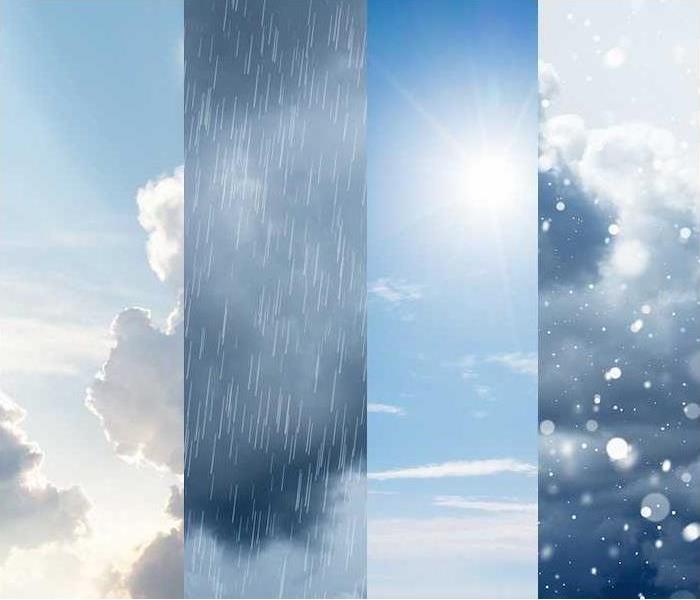 Extreme temperature changes can lead to severe weather. SERVPRO of Cherokee County is a click away if you experience any damage.
Extreme temperature changes can lead to severe weather. SERVPRO of Cherokee County is a click away if you experience any damage.
The United States, being one of the world’s largest countries in the world, has a tremendously diverse and expansive landscape. As a result, seasonal weather here is not one-size-fits all—different sections of the nation encounter different weather patterns, which results in variable degrees of weather threats for various regions.
Let’s examine the weather patterns that may occur as spring approaches and warm and cold air masses collide throughout the country—and also what we can consider here in Georgia.
The spring months in the Pacific Northwest are prone to heavy rain, which may result in flooding and water damage. Snow will continue to accumulate at higher elevations, and the melting and runoff associated with it can bring problems of their own.
The Upper Midwest and Northeast have the longest duration of winter, and will see frigid weather throughout the season. From Maine to the Dakotas, folks can expect cold weather and the possibility of blizzards and heavy snow even until late spring or early summer.
On the other hand, the Southwest and southern West Coast will need to keep an eye out for extreme heat waves that can damage lives and property. The South Pacific region, including Hawaii, will be on high alert for the possibility of tsunamis produced by tectonic activity.
The central United States, from Iowa to Texas, will also need to be on the lookout for windstorms, derechos and the potential of wildfires, which may spread rapidly when winds are high and conditions are dry. A notable portion of this area is Tornado Alley, which is especially prone to tornadoes.
Finally, here in the Southeast, we can expect to have a wide range of severe weather events, from thunderstorms and tornadoes in landlocked areas to early-season hurricanes along the coast later in the spring. April, in particular, will see the most tornadoes in Georgia than any other month throughout the year.
Wherever you live in the United States, extreme weather is a possibility. While it may vary from state to state, it never hurts to be aware of and prepared for severe weather.
If extreme weather leaves you with damage from water, fire or other elements, help is a click away. Contact your local SERVPRO of Cherokee County for fast, expert recovery.
Commercial Property: Flood Recovery and Financial Responsibility for Tenants
2/2/2022 (Permalink)
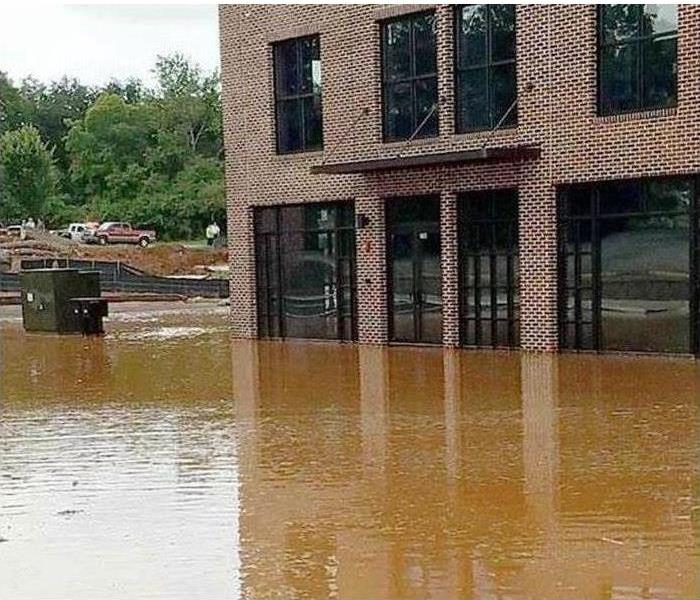 Flood damage in Free Home, GA.
Flood damage in Free Home, GA.
Flood Recovery and Financial Responsibility for Tenants
If your business is run out of a leased facility, you may be wondering what your financial obligations are after a flood or significant water damage. While business and renter's insurance will help you through the inevitable business interruption, there is the bigger picture of culpability and responsibility. Most of the answer depends on where you live and your lease agreement.
1. State Regulations
Most states require property owners to have commercial insurance coverage, and they also hold property owner’s accountable for repairs. However, depending on where you live, owner’s may be able to share responsibility with tenants under certain circumstances.
2. Lease Agreement
You may also want to review your lease agreement because there may be line items that refer specifically to water damage and who is ultimately responsible for the repairs. Your renter's insurance provider may be able to help you understand your rights as a tenant as well.
3. Personal Property
In most states, the property owner is responsible for the structure of the property, and the tenant is responsible for their personal property. In regards to businesses operating out of leased facilities, this means that the owner is responsible for the facility and you would be responsible for damaged equipment, which is likely covered under your business policy.
4. Restoration
While the owner’s property policy likely covers restoration work involving the structure of the facility, any damage done to your business, like inventory and equipment, is considered a personal business loss and will likely be covered by your insurance. You can contact your insurer or a disaster restoration specialist in the Free Home, GA, area for more details.
A flood is devastating for a business, but especially when that business operates out of a leased space. In most states, the property owner is responsible for structural issues while your business and renter's insurance is responsible for personal property losses.
The Flood Cut: Cutting Your Way Toward Restoration
1/12/2022 (Permalink)
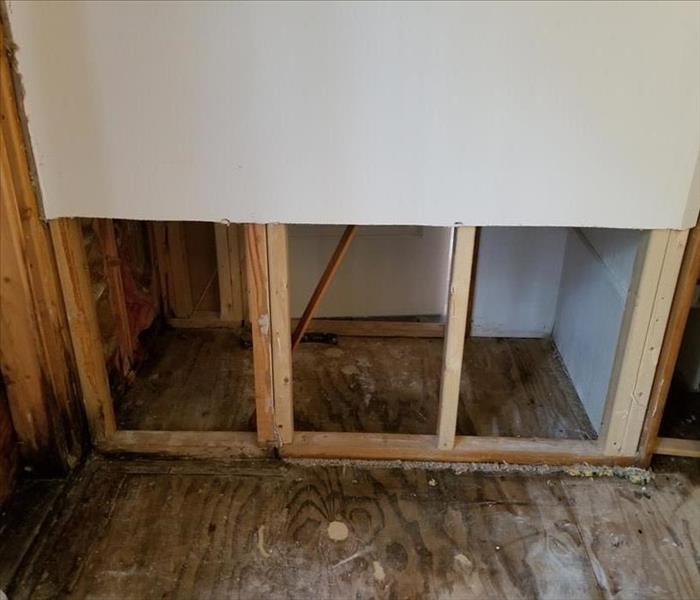 A flood cut was performed in a home in Lebanon, GA.
A flood cut was performed in a home in Lebanon, GA.
The Flood Cut
Flooding in your home is an emotional roller coaster and one that doesn’t end when the water recedes. The restoration process begins with property removal and the dreaded flood cut, which can leave many homeowners feeling like the restoration process is moving backward instead of forward.
1. What Is a Flood Cut?
A flood cut is a process of exposing wall studs to allow your home structure to dry without the worry of spreading mold and mildew. In order to reveal the studs, a cut must be made above the flood damage, about 12-18 inches, accounting for moisture absorption in the framing and insulation.
2. When Is It Necessary?
Flooding does not always consist of clean water. When a flood is caused by sewage or other polluted water, a flood cut is necessary to avoid contamination. The cut allows crews to remove affected insulation, drywall, and even studs to ensure the health and safety of you and your family.
3. Can It Be Avoided?
If the floodwater is clean water, then it is possible to avoid cutting open your wall, but only if the affected wall does not have insulation. In this instance, crews can drill several small holes into the affected drywall and insert flexible air hoses which used to pump dry, warm air into the cavity, drying the studs and drywall.
4. Is It a DIY Project?
You can try to perform a flood cut on your own, but if the floodwater was composed of sewage water, then it may be a better idea to call emergency restoration services in the Lebanon, GA, area. Sewage water is considered black water, and it presents many health risks to you and your family.
Flooding can cause a lot of damage structurally and personally, but a flood cut should not be looked at as furthering that damage. A cut is actually a step in the right direction, a step toward restoring order in your home, and while you may be able to perform this task on your own, be sure always to consider your safety first.
How to Put a Stop to Mold Growth After Flooding
11/10/2021 (Permalink)
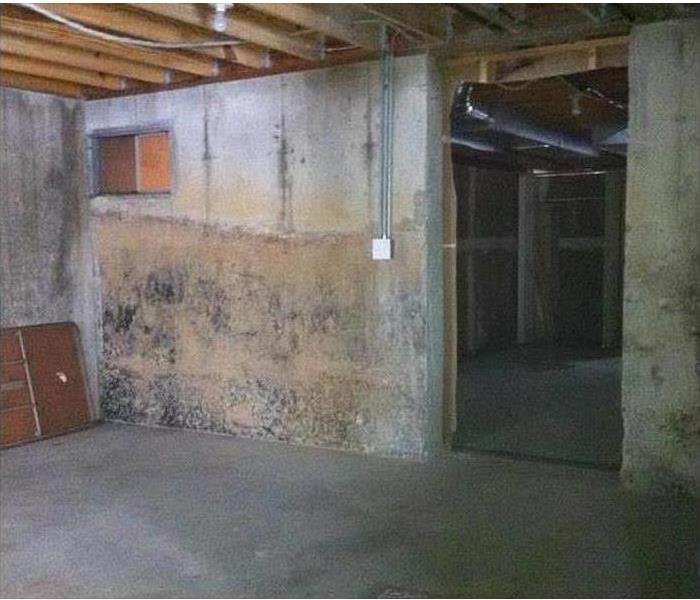 Water can lead to mold growth if not attended quickly.
Water can lead to mold growth if not attended quickly.
Minimizing Damages After Flooding
The most common natural disaster in the United States is flooding. Sadly, the damages experienced after a flood can last for several years after the water has receded. However, with quick action, you can slow down and control mold growth and reduce the effects of standing water. Follow this how-to guide to minimize damages after flooding.
Pinpoint Areas of Risk for Mold Growth
There are several spots throughout your property that could become ideal environments for mold. These may be
- under the carpeting
- in dark corners
- on wall paper
- all over cardboard boxes
- behind ceiling tiles
- on upholstery
The first action you take will be thoroughly drying any potential home for mold, so it's necessary that you identify the places most likely to encourage its growth.
Document the Damage
This step won't do much to control the growth of mold, but it may be very important as you contact mold remediation professionals or file an insurance claim. Take digital pictures with your phone or camera, detailing all of the damage and water-affected property.
Thoroughly Dry Your Property
Use as many methods of drying your spaces as possible. These options include opening doors and windows for ventilation, installing fans to increase air flow, and running dehumidifiers to pull moisture from the air. It's important to begin this process as soon as possible because mold may start growing within just 48 hours after water is present.
Remove and Discard
Many items affected by the standing water may be exposed to harmful bacteria and other dangerous substances. When you've taken appropriate steps to protect yourself, remove ruined items from the building and create a pile on your property. You may need to leave that pile there until an insurance adjuster inspects it. Any food that has been exposed to the flood water should be thrown out immediately.
Remember, it doesn't take long for mold growth to begin. Get started on remediation efforts as soon as you have the go-ahead from the proper Waleska, GA, authorities and be sure to use protective gear and safe work habits to minimize the risk of injuries and illness.
4 Ways to Prepare for Disaster
9/14/2021 (Permalink)
Ways To Be Prepared For The Worst
Businesses in Free Home, GA, know that the weather can be fickle. Instead of hoping for the best when the forecast is extreme, develop a disaster preparedness plan to be prepared. While torrential winds and rains may be unavoidable, other factors can result in a business interruption or the need for extensive water damage and restoration services. To help minimize risk and ensure safety is a priority, below are four tips to help be prepared for the worst.
1. Assess Potential Risk
Weather events may be the most common culprit for interruptions, but Mother Nature isn’t the only unknown. Since every business is unique, it is important to assess those unique potential risks. Old plumbing may lead to a pipe burst, power outages can happen out of the blue, and human error can result in a fire.
2. Backup Data
Business preparedness for nearly any company means ensuring vital documents, whether physical or on computers, is accessible after a storm or other event. Instead of waiting for a disaster to destroy them, keep them safe by creating physical backups that are safely stored offsite. With technology making data storage easier, digitally backup and encrypting data is easier and safer than ever.
3. Prepare a Plan
Disaster preparedness requires asking the what-ifs. How would each minute, hour, day or week unfold? Who will ensure everyone safely exits the premises? How will communications with clients and customers happen? These and other questions should be compiled into an emergency plan.
4. Maintain Communication
Maintaining communication is essential for safety and serves as a way to update everyone on any closure, changes of hours, or temporary relocations that are required. operations plan should emphasize more than what to do before a natural disaster impacts your company. It also should detail how communication will be maintained during the disaster and its aftermath.
While these are only a few disaster preparedness tips, sitting down and formulating a plan will help a business better weather a storm and find other ways to minimize potential losses.
Air Freshener Alone Isn’t Going to Cover That up: Flood Odor and the Removal Process
9/2/2021 (Permalink)
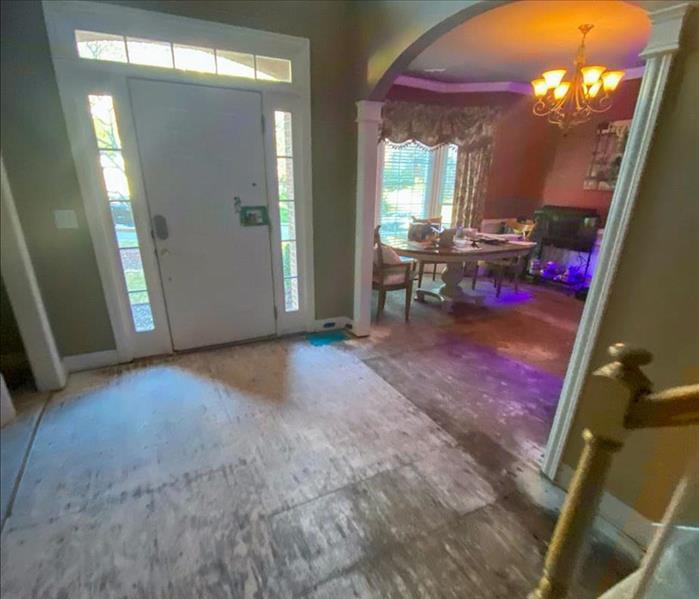 The odor that occurs after flooding is a combination of sewage and mold growth.
The odor that occurs after flooding is a combination of sewage and mold growth.
Flood water is typically a mixture of overflowing rivers and sewage loss. It is no surprise, then, that floods leave behind a significant odor when they recede, especially when you consider the addition of mold growth. For most homeowners, the elimination of the smell is the most substantial part of the removal process; however, it can be overwhelming to figure out just what to do. The following four steps should help ease your mind.
1. Wet Vac and Dry Flooded Areas
The first step to removing the odor in your home is the same as the first step for restoration: remove any excess water and dry flooded areas thoroughly. To speed up this process, you’ll want to have on hand several wet-vacs, industrial fans, and air movers. In addition to these tools, you should open up all doors and windows to help ventilate your home.
2. Remove Affected Materials
Beyond removing excess water and drying out damaged areas, you’ll want to remove all affected materials, including carpeting, draperies, drywall, and insulation. Any of these items that are left and may contain moisture can lead to further mold growth, which will contribute to both the odor and other health effects.
3. Steam Clean and Disinfect Everything
Once your home is thoroughly dry and affected materials have been removed, it is time to clean and disinfect everything. You will want to rent steam cleaners and purchase several mops and rags. You can begin by mopping all the floors and wiping down all walls with your choice of disinfectant. You can follow this by steam cleaning any remaining carpeting, draperies, or furniture. After you have done all the scrubbing, you should also disinfect any plumbing fixtures and ductwork.
4. Call an Expert
Cherokee County likely has several restoration specialists near you. There is no reason to have to go it alone. Experts offer a vast array of services, and their experience can be invaluable to you.
The odor that occurs after flooding is a combination of sewage and mold growth. While it may seem unbearable and resilient, the steps above should help you remove the odor and restore your home to some degree.
Fortifying Your Roof From Major Storm Damage: Steps Commercial Owners Can Do
6/14/2021 (Permalink)
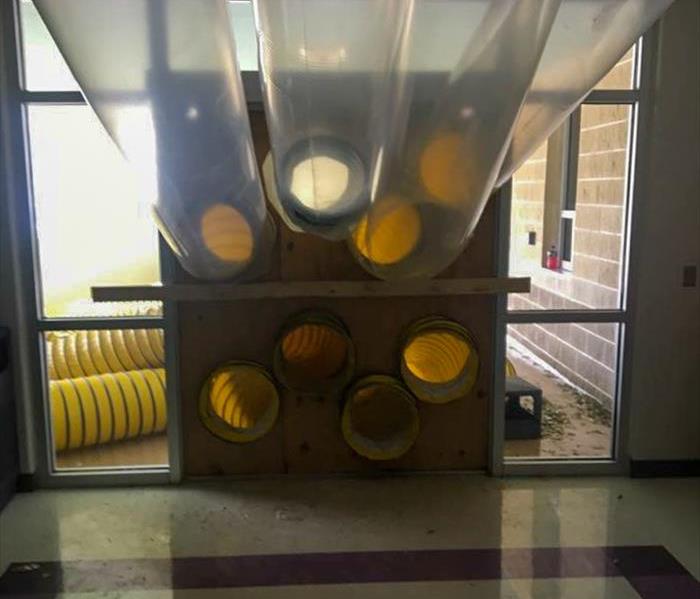 We can handle any commercial restoration job
We can handle any commercial restoration job
Preventative Measures To Avoid Roof Damage In Your Business
When a hurricane enters a city, no matter what the category, it's fierce and destructive. In fact, in 2019, the Congressional Budget Office estimated a total of 9 billion in commercial property destruction alone. The cost escalates because buildings incur massive impacts such as roof damage. Such issues demand expensive repairs. Proprietors in Lebanon, GA do have methods to mitigate this concern. Owners should take the following actions to reduce costs and remediation.
1. Be Aware of Waterflow
Where is the excess water from the storm going? Property is designed to have appropriate drainage; however, blockages occur that prevent the flow. After showers, walk the grounds, checking to ensure that puddles aren't forming near the facility or along the roof and foundation.
Tackle gutters: These become clogged with leaves and debris. The fluid should move freely to keep it from building on the roof. Too much weighs down the rooftop, permitting possible breaches. This event would require an expensive roof rebuild.
Eliminate large puddles: Work with landscapers and groundskeepers to avoid bushes from stopping the movement.
Check the land's slope: Water should make it to retention ponds. If not, redo the slant.
2. Repair Minor Issues Regularly
Twice a year, have a specialist survey for roof damage. Tend to any broken shingles, cracks, or holes immediately. These openings expose the barrier to possible water penetration. If large portions are left alone, it could harm the integrity. It's also beneficial to have a water restoration company evaluate for potential mold.
3. Be Cognizant of Possible Wind Hazards
Moisture isn't the only concern with hurricanes, wind damage is highly likely as well. Speeds are extreme, turning something seemingly harmless into a missile. Minimize this danger by bringing loose objects inside and keeping foliage trimmed and well-tended.
Commercial owners have little control during a hurricane, but before a storm rolls through, they do. Be aware of how roof damage occurs and take preventative measures to prevent it. That is an essential and powerful tool to reducing costs and headaches.
Some Basic Information on a Commercial Generator
3/30/2021 (Permalink)
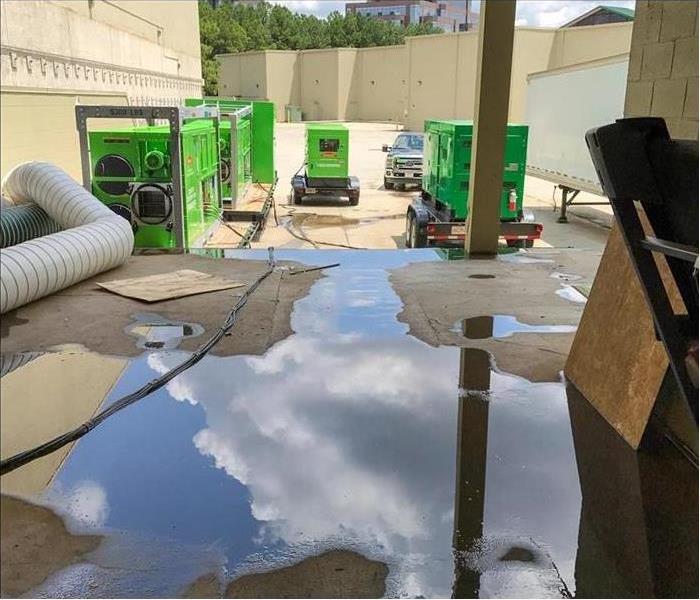 A trusted restoration franchise will respond quickly to clean the property.
A trusted restoration franchise will respond quickly to clean the property.
Basic Information On A Commercial Generator
You have probably experienced a power outage as a result of a powerful storm. If this happens in your home, being without power is a significant inconvenience. A power outage can cause food to spoil in your refrigerator and it can make your home too cold or too warm depending upon the season. If the power goes out in your business in Hickory Flat, GA, the potential problems are magnified. With a commercial generator, you have the ability to limit the impact of losing power. Unlike many home generators, a commercial unit can be permanently installed and will automatically kick in to create backup power.
Safeguard Your Entire Operation
You will have a choice of how much backup power your commercial unit will produce. This will depend in part on your operations. If you have a large amount of inventory that must remain frozen, you will want to make sure you can do this with your generator. The benefits to your operations of reliable backup power include the following:
- Keeps the lights on
- Allows the HVAC system to keep pipes from freezing
- Keeps IT systems running
- Protects security features of your building
- Increases worker and customer safety
Some companies might only require a small unit to keep priority systems running. This still allows for lighting and heating systems to work until full power returns.
Protect Your Company's Assets
If you do purchase a commercial unit, it is important to be able to avoid generator problems. With care and regular maintenance, you should be able to eliminate such issues as wet-stacking, improper fuel, coolant leaks and neglected maintenance. A local storm remediation company can also protect your property by mitigating storm damage. Highly-trained workers will arrive on-site in a matter of hours with the equipment and expertise to remove water and quickly restore your building. A trusted restoration franchise is just as important as a commercial generator to the vitality of your business.
How To Choose Storm Shutters for Your Home
1/15/2021 (Permalink)
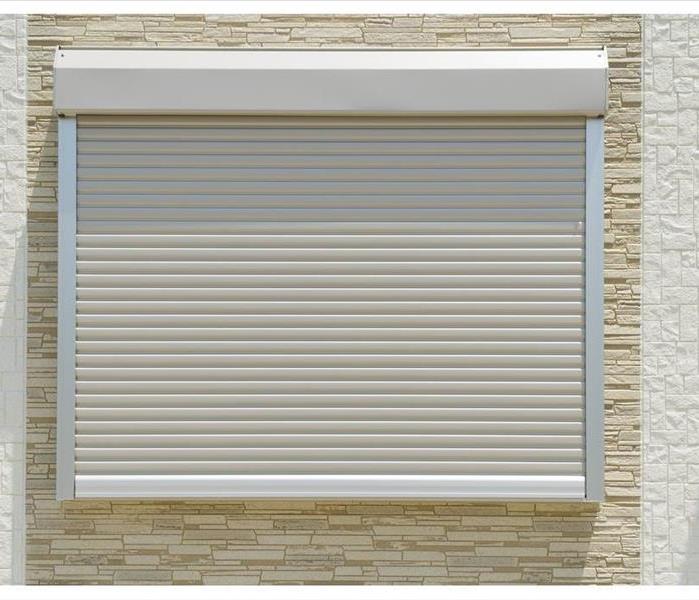 Roll down shutters installed in a Woodstock, GA home
Roll down shutters installed in a Woodstock, GA home
Types of Storm Shutters
If you live in an area that regularly experiences high winds, hurricanes, and tornadoes, such as Woodstock, GA, you may consider adding storm shutters to your home. One reason that people choose not install them is because of the high upfront cost. While these shutters can be pricier than others initially, the trade-off in a lower insurance bill, fewer repair costs, and the safety of your family members can outweigh the initial sticker shock. While there is a broad range of hurricane shutters to choose from, here are a few types with high, middle, and low pricing.
Motorized Hurricane Shutters
When you're ready to go all out to protect your home from high winds, motorized hurricane shutters are the way to go. Installing the shutters and motors will run between $6,000 and $10,000, depending on the size of your home. If your home has high windows, or you're concerned about your ability to properly place or close other types of window protection, a motorized option removes those barriers.
Roll Down Shutters
Roll down shutters sit comfortably in the middle of the range of options. Installed permanently above each window, roll down shutters deploy via a hand or motorized crank, travel down a track, and bolt at the bottom of the window. This style typically costs between $1,700 and $4,000.
Accordion Shutters
Short of nailing plywood over your windows, accordion shutters are the most cost-effective option. Running between $1,200 and $2,400, these shutters live in boxes on either side of the window and when opened, fold over to meet in the middle where you can secure them.
Hurricane shutters don't prevent damage from high winds if they aren't properly installed or secured. If your home does experience storm damage, a water damage remediation professional can help to get the repair process underway.
Despite high upfront costs, storm shutters can help to prevent more extensive damage that could be caused without them.
Flooding Means Dealing with Black Water
11/11/2020 (Permalink)
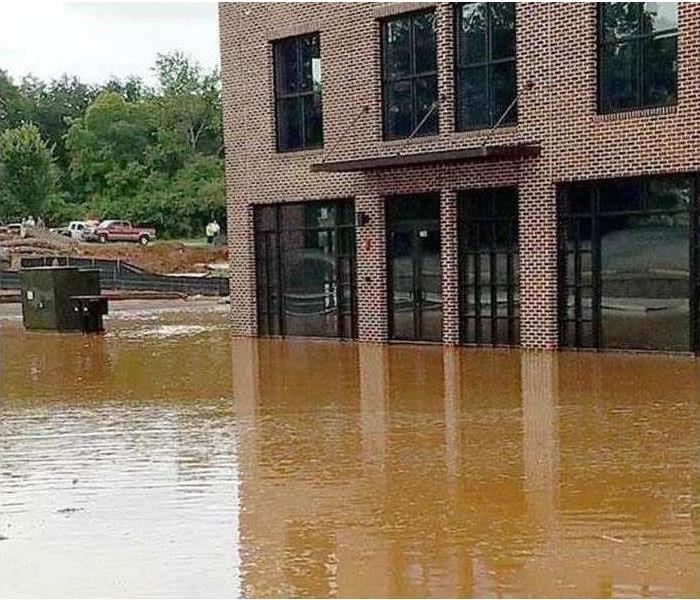 Flooded building in Lebanon, GA
Flooded building in Lebanon, GA
If faced with flooding in your Lebanon, GA, business, the excessive unwanted water can easily make you feel overwhelmed. While it can be easy to focus on the damage, the flood water itself needs to be considered first. There are three classifications of water that are important to understand before diving in to cleanup.
Water Categories
The cause of the water, whether storm damage or leaking pipe, determines how safe the water is to handle. The three categories are:
Clean Water – This is considered safe water that often comes from a faulty appliance, pipe burst, toilet holding tank leak or rainwater.
Grey Water – Although it does not contain fecal matter, this category means that the water has some contaminants. Sources include showers, dishwashers and toilets.
Black Water – This type requires additional safety measures to deal with since it is contaminated with human waste, chemicals, microorganisms and pathogens. Water that enters from outside the building or from the sewer are given this classification.
It is important to understand that even the first two categories can evolve into the third category. The longer water sits, the more likelihood of mold growth.
Call the Experts
Knowing that staying up and running and salvaging items in your property from flood water is essential to success, it can be easy to want to immediately start the cleanup process. When the cause is natural flooding, the mess should be left to a water damage and restoration company. A certified professional will have the tools and techniques to handle the potentially harmful water. From having the proper safety gear to using industrial-grade equipment to extract water to inspecting for signs of secondary damage and much more, a trusted professional can make it “Like it never even happened.” They are also trained to restore belongings, including electronics and document.
Dealing with flood water requires careful consideration before cleanup can even begin. Knowing the categories of water and that help is just a call away can ensure a safe and proper cleanup.
What Not to Do After a Flood
10/20/2020 (Permalink)
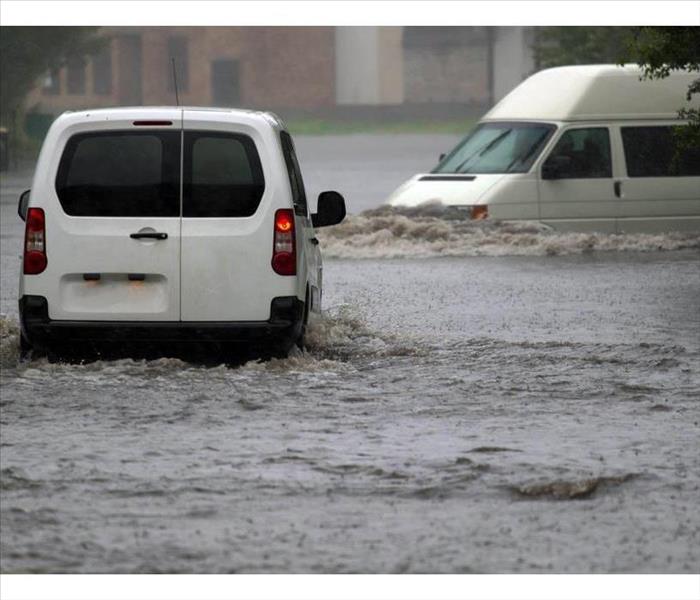 Never drive through a flooded street
Never drive through a flooded street
Avoid The Following If You Have Suffered From Flood Damage
Dangerous flood water can cause problems for anyone, even if you've never experienced a flood before. Knowing the correct, and incorrect, actions to take during and after the incident can, not only save your life but also help you avoid subsequent property damage. Make sure to avoid the following if your home in Holly Springs, GA, has recently suffered from a flood.
1. Never Enter a Moving Flood.
There are a number of reasons why wading or swimming in flood water is a terrible idea. The water could likely contain harmful biohazards or other contaminants. Likewise, it's difficult to tell how quickly the current is moving. It only takes about 6 inches of water to sweep you away.
2. Never Disobey Emergency Response Crews.
First responders, local authorities and other types of emergency response crews exist to help you. Disobeying or ignoring them can put you in danger, as well as make their jobs significantly more difficult. You're better off listening to what they have to tell you and following their directions.
3. Never Touch Standing Water.
Just because the water in your flooded home isn't moving, doesn't mean it's safe. Much like the flood currents, this standing water could contain harmful biohazards. It's also possible that the water could be electrically charged, especially if it has come into contact with an outlet or electronic device.
4. Never Drive Through a Flood.
It only takes about a foot of water to sweep your car away. Avoid catastrophe by simply keeping away from the water to the best of your ability.
5. Never Ignore Water Damage.
All types of floods can cause damage, not just severe ones. After the authorities give you permission to return home, you need to take immediate action to remediate any water damage. Leaving it untreated can cause mold growth and other types of structural damage.
Flood water should never be taken lightly. Staying alert and listening to your local authorities is the best way to keep yourself and your family safe. If your home has suffered damage following a flood, you need to contact flood remediation experts.
3 Things You Shouldn't Do After a Flood
8/7/2020 (Permalink)
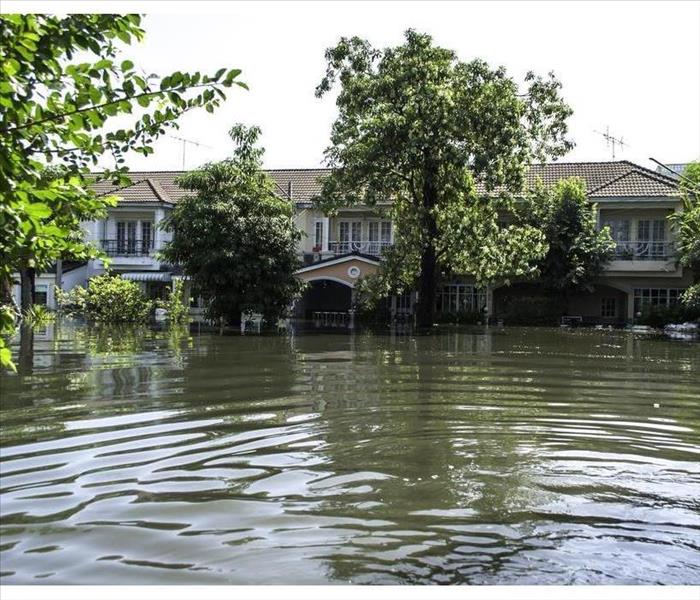 Storm damage in Lebanon, GA
Storm damage in Lebanon, GA
Three Things You Shouldn't Do After A Flood
Storms are especially devastating because they occur with little to no warning. Whether you’ve experienced a storm or are hoping to avoid one, it’s a good idea to know how to handle the situation. A good understanding of storm and water damage will help you minimize the destructive effects on your Lebanon, GA, home. Here are three things you shouldn’t do after flood water has entered your home.
1. Don't Stay In Your Home
After a flood, many homeowners want to stay in their homes to try and reduce the amount of damage. Unfortunately, it may be unsafe to stay in your home due to the following conditions:
- Contaminated water
- Damaged electrical lines
- Bursting dams
- Mold
One of the best things you can do if you have a flooded home is to get out and stay with relatives or in a hotel. You’ll be able to take care of your home better if you have a safe place to stay.
2. Don't Attempt To Clean Up on Your Own
Similar to hiring a professional to handle a plumbing problem in your home, it’s wise to hire restoration specialists who have the tools and training to clean your home. Floodwater can be contaminated with sewage, which is harmful. Local stores may be out of fans, wet-dry vacuums, and generators. Restoration specialists have the trucks, equipment, and knowledge to safely handle any situation in your home. Flooding can easily and quickly cause mold growth; therefore, it’s wise to enlist the help of professionals.
3. Don't Delay in Contacting Insurance Carrier and Mortgage Lender
Some homeowners fail to contact their insurance carrier early on in the process. Unfortunately, this can lead to major delays in a resolution. It’s wise to contact your insurance company immediately to inform them of your situation. It’s also wise to contact your mortgage lender to see if you qualify for deferred payments or waived late fees. Being honest about your situation should help with your circumstances.
If your home is affected by floodwater, don’t stay in your home, clean up by yourself, or delay in contacting your insurance and mortgage companies.
 Extreme temperature changes can lead to severe weather. SERVPRO of Cherokee County is a click away if you experience any damage.
Extreme temperature changes can lead to severe weather. SERVPRO of Cherokee County is a click away if you experience any damage.





 24/7 Emergency Service
24/7 Emergency Service









